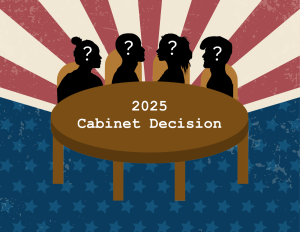The Rice Family Pavilion hummed with the chatter of students and faculty alike as people took their seats. Handheld Greek and American flags were scattered about saving seats and flapping in the hands of parents. This was the Great Debate.
Teams from both Rollins and Hellenic American University (HAU) competed at the Great Debate. As a result of a coin flip help 2 days prior, Co-Captains of the Rollins Debate Team Abrielle Mannino (‘25) and Jiya Manchanda (’25) represented Rollins and argued in opposition to the resolution that corporations should have the right to deny services to members of the LGBTQ+ community on religious grounds. Andriana Gounalaki (’24) and Androniki Fili (’25) argued in favor of the resolution ion representing HAU. Audience members were encouraged to shout “Here here!” when debaters made a point they agreed with, and “Shame!” when debaters said something they disagreed with.
After more than an hour of oral arguments, the judges for the evening declared Rollins the winner of the Great Debate in a 4-3 decision. The teams shook hands as a roar rose from the crowd, and audience members quickly ran up to the debaters to share in the celebration.
The History of the Great Debate
The Great Debate is an annual exhibition debate hosted by the Rollins College Debate Team. The team began in 2007 when Dr. Eric Smaw, now special assistant to the Provost, was hired to teach in the Department of Philosophy and Religion. The Great Debate Initiative was started as a part of the International Debating and Cultural Exchange program with four goals in mind. The team intended to form partnerships with international schools, develop or create debating programs at these schools, engage in cultural exchange, and commit to community outreach with local middle and high schools.
Since that initial vision, Rollins has engaged in partnerships with schools around the world. Beijing Foreign Studies University, iDebate Rawanda, and Cambridge University are just some of the schools the team has partnered with in the past. HAU is the newest partnership in the Great Debate Initiative; both teams have plans to expand debate opportunities throughout Greece and beyond.
“Our hope is that HAU will become a hub of debating in the Mediterranean, and then [the team will] move from the Mediterranean to the EU and continue traveling around the world,” Smaw said.
After initial talks began in 2015, HAU and Rollins’ partnership took shape in the summer of 2023. Members of the Rollins Debate Team joined Smaw and Professor Joshua Brown from the Philosophy and Religion Department in Athens to train the inaugural class of debaters at HAU.
“We work from the ground up,” said Mannino. Training involves everything from argument development and public speaking to professionalism in and out of a debate setting.
Tackling tough issues
The Great Debate puts a focus on highlighting some of the most controversial issues facing the U.S. Last year, for instance, the teams debated abortion rights in the wake of Dobbs v. Jackson Women’s Health Organization, a landmark case that overturned Roe v. Wade and removed court protections for abortion at the federal level.
This year, the teams had to debate whether corporations have the right to deny services to members of the LGBTQ+ community on religious grounds.
“We went back and forth with the resolution so many times when we were coming to it,” Manchanda said. The topic was selected back in September based on the recent Supreme Court decision in 303 Creative LLC v. Elenis, where the court ruled that corporations are protected by the First Amendment from having to create designs for individuals if they go against the designer’s beliefs. “The Great Debate initiative is one way to bring those issues to light.”
For Fili, the topic was difficult to consider at first pass. “My first initial reaction was, ‘Why are we debating this?’ There is a very clear position on this, which is the opposition. But then when we had the chance to discuss this and view the opposite side, it was mind opening,” Fili said.
A fundamental part of the debate process is teaching students to separate their personal views on a topic from the position they are taking in a debate.
“As a debater, if you don’t understand both positions and if you don’t have a way to think about what the justification is for the other position, then you’re not going to be able to engage in those conversations in a democracy,” said Manchanda.






Comments are closed.